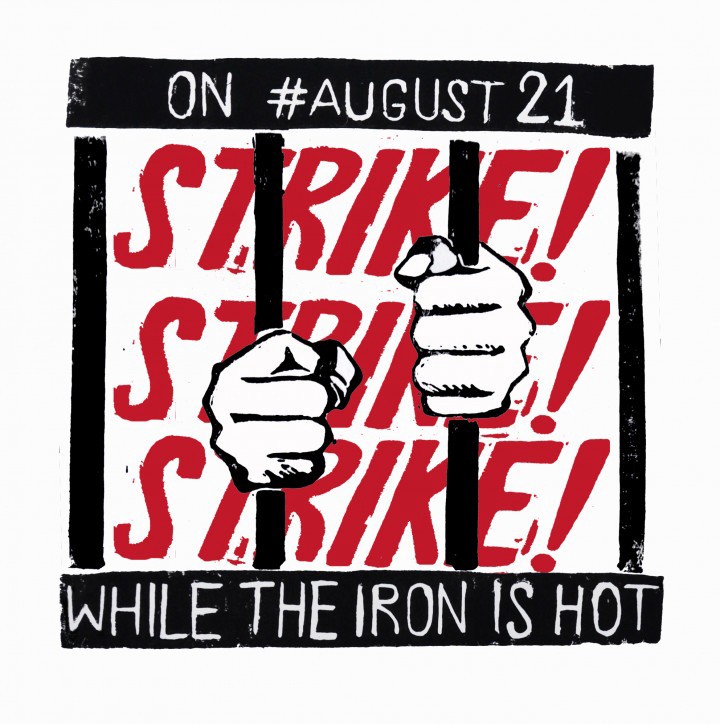Old John Brown’s body still lies mouldering in his grave, as the largest prison strike in US history kicked off on August 21st, 2018. In at least 17 states, and Canada, inmates are using sit-ins, boycotts, hunger strikes, and work stoppages, to demand their human rights. Jailhouse Lawyers Speak (JLS), an inmate-based organization that is representing the strikers, claims the action is in response to “a lack of respect for human life that is embedded in our nation’s penal ideology,” and that “these men and women are demanding humane living conditions, access to rehabilitation, sentencing reform and the end of modern day slavery.” They are being joined by countless public demonstrations of solidarity across the country. They have issued ten national demands:
Immediate improvements to the conditions of prisons and prison policies that recognize the humanity of imprisoned men and women.
An immediate end to prison slavery. All persons imprisoned in any place of detention under United States jurisdiction must be paid the prevailing wage in their state or territory for their labor.
The Prison Litigation Reform Act must be rescinded, allowing imprisoned humans a proper channel to address grievances and violations of their rights.
The Truth in Sentencing Act and the Sentencing Reform Act must be rescinded so that imprisoned humans have a possibility of rehabilitation and parole. No human shall be sentenced to Death by Incarceration or serve any sentence without the possibility of parole.
An immediate end to the racial overcharging, over-sentencing, and parole denials of Black and brown humans. Black humans shall no longer be denied parole because the victim of the crime was white, which is a particular problem in southern states.
An immediate end to racist gang enhancement laws targeting Black and brown humans.
No imprisoned human shall be denied access to rehabilitation programs at their place of detention because of their label as a violent offender.
State prisons must be funded specifically to offer more rehabilitation services.
Pell grants must be reinstated in all US states and territories.
The voting rights of all confined citizens serving prison sentences, pretrial detainees, and so-called “ex-felons” must be counted. Representation is demanded. All voices count.
The full statement can be read here.
The strike was planned to coincide, on August 21st, with the anniversary of the murder, of black prison organizer, George Jackson, and end, on September 9th, with the anniversary of the famous Attica Prison Uprising.
The strike is a culmination of months of organizing, after the neglect of the prison authorities, at the South Carolina Lee Correctional Institution (LCI), lead to the death of 7 inmates, and dozens injured, last April 15th. Corrupt guards extorted inmates for money in exchange for contraband, and the basic goods that the prison lacked, and used their positions of power to fuel gang violence. This lopsided dynamic resulted in a massive riot that grew from an argument over contraband. Correction’s officers refused to intervene or aid the injured, and broken cell doors kept anyone from escaping the violence.
JLS called the events in April “only a reflection of the issues facing other states and governmental buildings of confinement.” Continuing in their pre-strike statement, JLS claimed the issues of the American prison system was a “systematic problem born out of slavery.”
This is fundamentally an issue of slavery, and no amount of feel-good rhetoric can change that. If you open up any high school history textbook, it will likely say slavery was abolished, in 1865, with the ratification of the 13th amendment to the United States Constitution. In Section 1 of the 13th amendment, slavery is abolished “except as a punishment for crime.”
When there’s a will there’s a way, and since reconstruction, prisons have been the best way. While the chain-gang has gone out of style, using the disproportional black prison population, has not. Inmate labor is used for everything from attending the Louisiana governor’s mansion, to construction, to manufacturing, and agriculture.
Proponents of inmate labor, and its large generated revenue ($558 million in 2015) will talk about its humanitarian character. Any purported benefit simply highlights a fundamental issue of the justice system. A break in monotony would not be needed if prisons were not simply rows of cages, and if simple goods were provided for free, or even remotely at cost, an inmate would not be so desperate for cash flow.
The truth is that prisons are intentionally made to be horrid to incentivize “volunteers” for labor, and government actors could not care less. In the words of JLS:
Prisoners understand they are being treated as animals. We know that our conditions are causing physical harm and deaths that could be avoided if prison policy makers actually gave a damn. Prisons in America are a warzone. Every day prisoners are harmed due to conditions of confinement. For some of us it’s as if we are already dead. So what do we have to lose?

